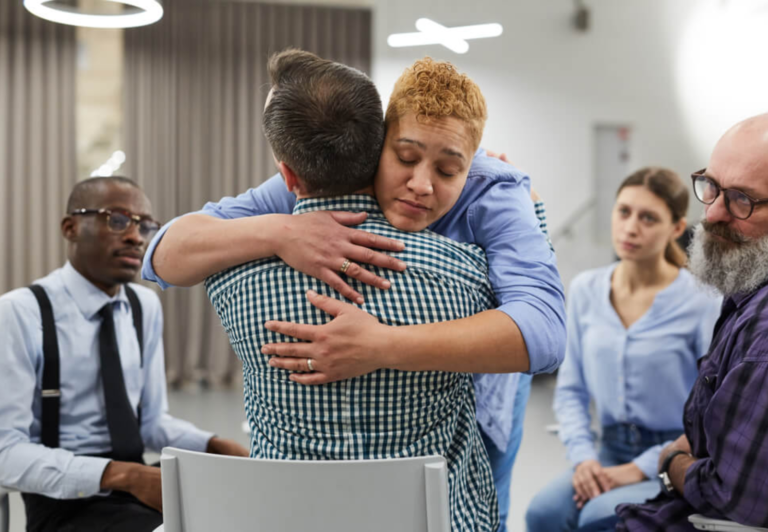Healing Hearts: Nurturing the Wounds of Loss and Learn how to deal with grief
"
In this article, we delve into the depths of grief, exploring its stages, impact on mental health, and strategies for healing, providing guidance and support on the path to finding solace and renewal.
Let's dive right in..
Hey there,
Have you ever experienced that deep ache in your heart when you’ve lost someone or something dear to you? That feeling of emptiness that seems to consume your every thought and emotion?
Well, you’re not alone.
Grief is a journey we all embark on at some point in our lives, and it’s a journey that’s uniquely ours.
Imagine the loss of a beloved pet, like your loyal furry friend who was always there to greet you with a wagging tail. The void they leave behind is immeasurable when they’re no longer by your side.
Or perhaps you’ve faced the pain of a broken relationship, where the future you had imagined suddenly crumbled before your eyes, leaving you in a state of bewilderment and sorrow.
Grief is more than just a word. It’s a complex tapestry of emotions and experiences that we weave through. It’s that rollercoaster ride of ups and downs where you may find yourself in moments of denial and shock, unable to comprehend the reality of the loss.
The fiery flames of anger and frustration burn within you, seeking someone or something to blame. It’s the maze of “what-ifs” and regrets as you bargain and seek solutions in an attempt to rewrite the past.
It’s the sea of sadness and depression that engulfs you, where tears become your closest companion. And ultimately, it’s about finding acceptance and gradually moving forward, honoring the memories while embracing the present.
But grief isn’t just an emotional experience. It can also impact your mental health in profound ways. You may grapple with intense sadness and anxiety, struggling to concentrate or make decisions. The grief journey is unique to each person, and your path may differ from others, but know that support and guidance are available to help you navigate this challenging terrain.
Remember, grief is not a sign of weakness; it’s a testament to the love and connections you’ve cherished. You’re not alone in this journey; there is hope for healing and renewal. So, take a deep breath, hold onto that glimmer of hope, and embark on this compassionate journey through grief together.
Embracing Grief With A Journey of Healing and Growth
Let’s get started
You Might Ask, What Is Grief, and Why Does It Matter?
Hey there, Let’s take a deep breath. Grief isn’t just a simple concept; it’s a swirling mix of emotions, like a wild roller coaster ride. We feel it when we’ve lost something or someone precious to us. And trust me, understanding and acknowledging grief is essential for our well-being.
This is a journey most people struggle with. You need to find out where you are right now to your path toward happiness. Let’s figure that out below.
Explore the 4 Stages of Grief
Let’s get started
Grief isn’t a straight path—it’s more like a winding road that takes us through different stages. Picture this: imagine you’re going on a hike through the mountains. Along the way, you encounter various terrains with challenges and beauty. Well, grief is similar. Let’s explore the stages together and find meaning in them.
1. Denial and Shock:
It’s When the World Stops Making Sense
The first stage is like standing on shaky ground. We might find ourselves in denial and shock, unable to fully grasp the magnitude of our loss. It’s as if our mind tries to protect us from the harsh reality, creating a temporary shield against the pain.
For example, when Priya lost her beloved dog, Oreo, she couldn’t believe he was gone. She expected to see him wagging his tail at the door every time she came home. The shock numbed her senses, making it hard to accept the truth.
2. Anger and Frustration
It’s When the World Stops Making Sense
As we continue our journey, we encounter a fiery stage—anger and frustration. These emotions can flare up like wildfire, consuming us with their intensity. We may direct our anger at others, ourselves, or even the universe, seeking someone or something to blame for our pain.
Think of Mahesh, who lost his job unexpectedly. He was angry at his employer and at the circumstances that led to his dismissal. He felt frustrated that his hard work seemed to count for nothing. This anger was a manifestation of the love and passion he had for his career.
Trying to Navigating the Maze of What-Ifs
In the next stage, we find ourselves bargaining and seeking solutions. It’s like trying to negotiate with the universe, hoping we can turn back time or find a way to reverse the loss. We might find ourselves lost in a maze of “what-ifs” and regrets.
Take Shruthi, for example. After ending a long-term relationship, she kept replaying moments in her mind, wondering if she had done something differently and if she could have saved their love. She desperately sought a way to undo the pain, bargaining for a second chance.
3. Depression and Sadness
Desperately Navigating the Sea of Tears
As we venture deeper into grief, we encounter a vast sea of sadness and depression. It’s as if waves of sorrow wash over us, threatening to pull us under. We mourn the absence of what we’ve lost, and tears become our constant companions.
Remember Ananya, who lost their best friend to illness. They felt an overwhelming sadness, a heaviness in their heart that seemed to drown them. They withdrew from activities they once enjoyed, feeling engulfed by the depth of their grief.
4. Acceptance and Moving Forward
You Start Finding Strength in Letting Go
Finally, we reach a stage where acceptance and the gradual process of moving forward become possible. It doesn’t mean forgetting or minimizing the significance of the loss. Instead, it’s about honoring the past and embracing the present and future with open arms.
When Priya lost her elderly grandmother, she went through a long journey of grief. Over time, she accepted that her grandmother had passed away and cherished their shared memories. She found solace in knowing her love for her grandmother would live on in her heart.
The Impact of Grief on Mental Health
So this is how it works
Understanding the Emotional Symptoms of Grief
Grief takes a toll on our mental health, my dear friend. It sends ripples of emotions throughout our being, affecting us in various ways. We might experience
- Deep sadness,
- Anxiety,
- Restlessness, and
- A profound sense of loss.
For instance, Karthik, who lost his close friend, felt intense waves of sadness crashing upon him. His heart ached, and he struggled to shake off the heaviness. Anxiety and restlessness consumed him, making it difficult to find peace.
Navigating the Cognitive Symptoms of Grief
Grief can fog our minds, making concentrating or making decisions challenging. We may find ourselves lost in a maze of thoughts, struggling to find clarity and focus.
Like Radhika, who lost her parent, she found it hard to concentrate at work. Her mind was preoccupied with memories and questions that seemed to spin endlessly. She experienced difficulty making even simple decisions as her thoughts became entangled in the web of grief.
Understanding the Behavioral Symptoms of Grief
Grief can also manifest in our behavior, causing significant changes as we adapt to a new normal. We may withdraw from social interactions, lose interest in activities we once enjoyed, or experience mood swings.
Consider Vivek, who experienced the loss of a close relationship. He withdrew from social gatherings and isolated himself from friends, finding solace in solitude. He lost interest in hobbies and struggled with mood swings, feeling like he was on an emotional rollercoaster.
The Importance of Grief Counseling
Pay close attention
What Is Grief Counseling
During times of grief, seeking professional help through grief counseling can be an invaluable source of support. Grief counseling provides a safe haven where you can share your experiences, emotions, and memories with a trained professional who understands the intricacies of grief.
The 3 Benefits of Seeking Grief Counseling
Grief counseling offers numerous benefits on your healing journey:
1. Providing a safe space for expression
In counseling, you can freely express your grief without judgment or fear, allowing your emotions to find validation and release.
2. Guidance in understanding and navigating grief
A counselor can help you gain insights into your unique grieving process, offering guidance as you navigate the often complex emotions and challenges that arise.
3. Developing coping mechanisms and resilience
Through counseling, you can learn effective coping mechanisms to navigate the ups and downs of grief. You’ll develop resilience and find strength within yourself.
Strategies for Dealing with Grief
Let me show you how
1. Encourage Healthy Grieving
In navigating grief, you must honor your emotions and seek support from those around you. Healthy grieving involves allowing yourself to feel and express the full range of emotions that arise.
Remember, grief isn’t a burden you have to carry alone. Reach out to loved ones, friends, or support groups who can provide comfort, understanding, and a listening ear.
2. Practice Self-Care During Grief
Practicing self-care during grief is crucial for your well-being:
- Take care of your physical health
Engage in regular exercise, nourish your body with nutritious food, and prioritize restful sleep. Physical well-being is intertwined with emotional healing.
- Prioritize rest and relaxation
Allow yourself moments of quiet reflection, relaxation, and self-compassion. Give yourself permission to rest and recharge, knowing that healing takes time.
- Find solace in relaxing activities
Engage in activities that bring you comfort and peace. It could be reading a book, spending time in nature, or listening to gentle music. Find what resonates with your heart and indulge in those moments.
3. Explore Therapeutic Techniques
Unleash the healing power within you by exploring therapeutic techniques:
- Journaling and writing
Pour your thoughts and emotions onto paper. Journaling can be a cathartic release, helping you gain clarity and understanding of your feelings.
- Embrace mindfulness and meditation
Practice being present at the moment, allowing yourself to observe your thoughts and emotions without judgment. Engage in meditation exercises that bring calm and inner peace.
- Seek creative outlets
Express your grief through art, music, or other creative pursuits. Creating something meaningful can serve as a channel for healing and self-expression.

Here are a few steps you can take to help yourselves to cope with grief -
1. Live one day at a time:
Ttake small steps daily, make a routine for yourself, and involve yourself in exercise, meditation, and relaxation practices.
2. Stay in touch with "your people":
having a supportive circle around you when you're grieving is essential. Spend time with your loved ones, talk to them about your feelings, and accept/ ask for help whenever required.
3. Join a support group:
there might be people who have faced similar situations like yours; by being a part of support groups, you'll feel less alone and may get a different perspective on your problem.
We often feel helpless when we see a person grieving. Here are a few things you can do to support a grieving person-
1. Reach out to the person
Do not hesitate to initiate the conversation if you know someone grieving and want to help them. Contact them and ask if they will talk or need any help.
2. Offer practical help
A small help can go a long way; grieving people may have difficulty finishing day-to-day tasks, but you can offer support with cooking meals for them, shopping for essentials like medicines, etc.
3. Be sensitive towards their feelings and condition.
Healing from grief takes time, be sensitive about what might hurt them and whether the person is comfortable talking about their loss.
Even though grieving is a natural process and takes a lot of time to heal if you see the person indulging in self-harm or finding it difficult to move on, seek professional help.
Final Thoughts
To sum it up
In the midst of grief, remember that healing is possible. Take comfort in knowing that grief counseling provides a safe and compassionate space for you to share your pain and navigate the complexities of your journey.
Let yourself be supported by professionals who understand and guide you toward healing. You are not alone, and there is hope for a brighter tomorrow. Reach out, embrace counseling, and allow yourself to heal and find solace on this transformative path.
Embrace the stages of grief, knowing that they are signposts along the path to healing. Seek support when needed, whether through professional counseling or the love and understanding of those around you. And above all, be gentle with yourself as you navigate the intricate landscape of grief.
Subscribe to new post
The One Liner
Useful Links
Order Related Queries
Useful Links
Order Related Queries
















It was a great article taking us through the whole story of how grief works. Even though it is not necessary to go through grief to become strong, it surely throws light into what we can rectify and be precautionary if it happens again. Also almost everyone goes through grief and kudos to all the people who are working through their way up!!
You’re not alone <3